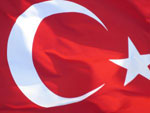 Wall Street Journal: Turkey’s Prime Minister Recep Tayyip Erdogan said Thursday that Ankara is seeking to triple trade volumes with Iran over the next five years, in comments likely to raise concern in Washington at a time when U.S.-led sanctions are deterring many investors from doing business with the Islamic Republic.
Wall Street Journal: Turkey’s Prime Minister Recep Tayyip Erdogan said Thursday that Ankara is seeking to triple trade volumes with Iran over the next five years, in comments likely to raise concern in Washington at a time when U.S.-led sanctions are deterring many investors from doing business with the Islamic Republic.
The Wall Street Journal
By JOE PARKINSON
 ISTANBUL—Turkey’s Prime Minister Recep Tayyip Erdogan said Thursday that Ankara is seeking to triple trade volumes with Iran over the next five years, in comments likely to raise concern in Washington at a time when U.S.-led sanctions are deterring many investors from doing business with the Islamic Republic.
ISTANBUL—Turkey’s Prime Minister Recep Tayyip Erdogan said Thursday that Ankara is seeking to triple trade volumes with Iran over the next five years, in comments likely to raise concern in Washington at a time when U.S.-led sanctions are deterring many investors from doing business with the Islamic Republic.
In a speech in Istanbul to business delegates interested in investing in Iran’s mainly state-owned machinery, automotive and textile industries, Mr. Erdogan said the two countries were near signing a “preferential trade agreement” that could see trade volumes swell to $30 billion in the period.
Mr. Erdogan was hosting the meeting with Iranian Vice President Mohammad Reza Rahimi.
“I can’t see any reason why we can’t establish an unimpeded trade mechanism with Iran similar to the one with Europe,” the Turkish leader said. “There are lots of things that we can give to Iran, as Turkey has made a serious industrial leap.”
Mr. Rahimi said the Islamic Republic was working on legislation to remove all trade barriers with Ankara and had “no better friend than Turkey in today’s world.”
Mr. Erdogan’s comments will likely add to concerns in Washington that his Islamist-leaning government is turning away from the West in its regional policy priorities.
The government, which strengthened its public support with strong victory in Sunday’s vote for constitutional amendments, is seeking closer diplomatic and economic ties with many of its neighbors, including Iraq, Syria and Russia. A process, analysts say, that has been accelerated by crisis in relations with one-time ally Israel.
Ankara has vigorously denied any such shift.
Separately, an explosion hit a minibus early Thursday, killing at least 10 people in Hakkari, an area bordering Iran and Iraq where Kurdish rebels have been active, the local governor said. The exact nature of the blast, or what group may have been involved, wasn’t immediately clear.
Turkey-Iran trade has surged in recent years, reaching $10 billion in the past year, compared with $1 billion in 2000. Some 80% of that represents Iranian exports, mostly natural gas.
The Islamic Republic supplies Ankara with one-third of its energy needs. Official figures show bilateral trade jumping 86% in the first seven months this year.
U.S.-led sanctions imposed in July by the United Nations Security Council aim to choke Tehran’s nuclear program by targeting the Islamic Republic’s financial-services and energy sectors, making international transactions harder and hitting Iran’s ability to import gasoline and secure foreign investment.
Turkey, which took over the presidency of the Security Council this month, voted against U.N. sanctions but pledged to adhere to them. Ankara stresses it is attempting to improve ties with Iran in areas not stipulated by the measures. Turkey is the sole predominantly Muslim member of the North Atlantic Treaty Organization and the alliance’s second-largest military participant.
Tehran insists its nuclear program is for peaceful purposes.
Analysts said the Turkish government is seeking to capitalize on the diplomatic risks it has taken in backing Iran while the West applied sanctions. And some Turkish businessmen appear anxious to take advantage of investment gaps created by those sanctions and by a number of privatizations slated to take place next year in Iran.
But the analysts added that big companies weren’t likely to take unnecessary risks by significantly boosting their trade with Iran.
“This is part of a pattern of rhetoric from the Turkish government and largely for a domestic audience, but the reality on the ground is that the Turkish large banks and industrial groups are not going to take the risk of large penalty actions of the U.S.,” said Wolfango Piccoli, an director at Eurasia Group, a political-risk consultancy.
Many of the largest Turkish banks, including AkBank and Garanti bank, have U.S. shareholders. Turkcell, the country’s leading telecommunications company, is jointly listed on the New York Stock Exchange.
There are signs that sanctions are eating into bilateral trade. Data from the Istanbul Exporters’ Association of Chemical Materials show Turkey didn’t export any gasoline to Iran in August, compared with 35,900 metric tons the previous month. Turkey’s only oil refiner Tupras, said last month that it had stopped exporting petroleum products to Iran and wasn’t liable to be penalized under the sanctions regime.
Turkey also favors a diplomatic solution to tensions over Iran’s nuclear program. In May, in a move that caused friction with Washington, Mr. Erdogan and Brazil’s President Luiz Inacio Lula da Silva brokered a uranium swap deal that they hoped would stave off sanctions and ease fears in the West that Iran’s nuclear program was a front for creating weapons.


